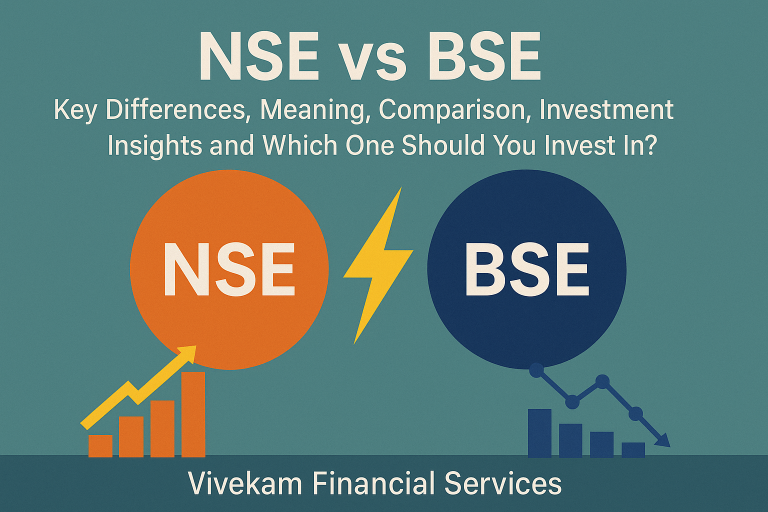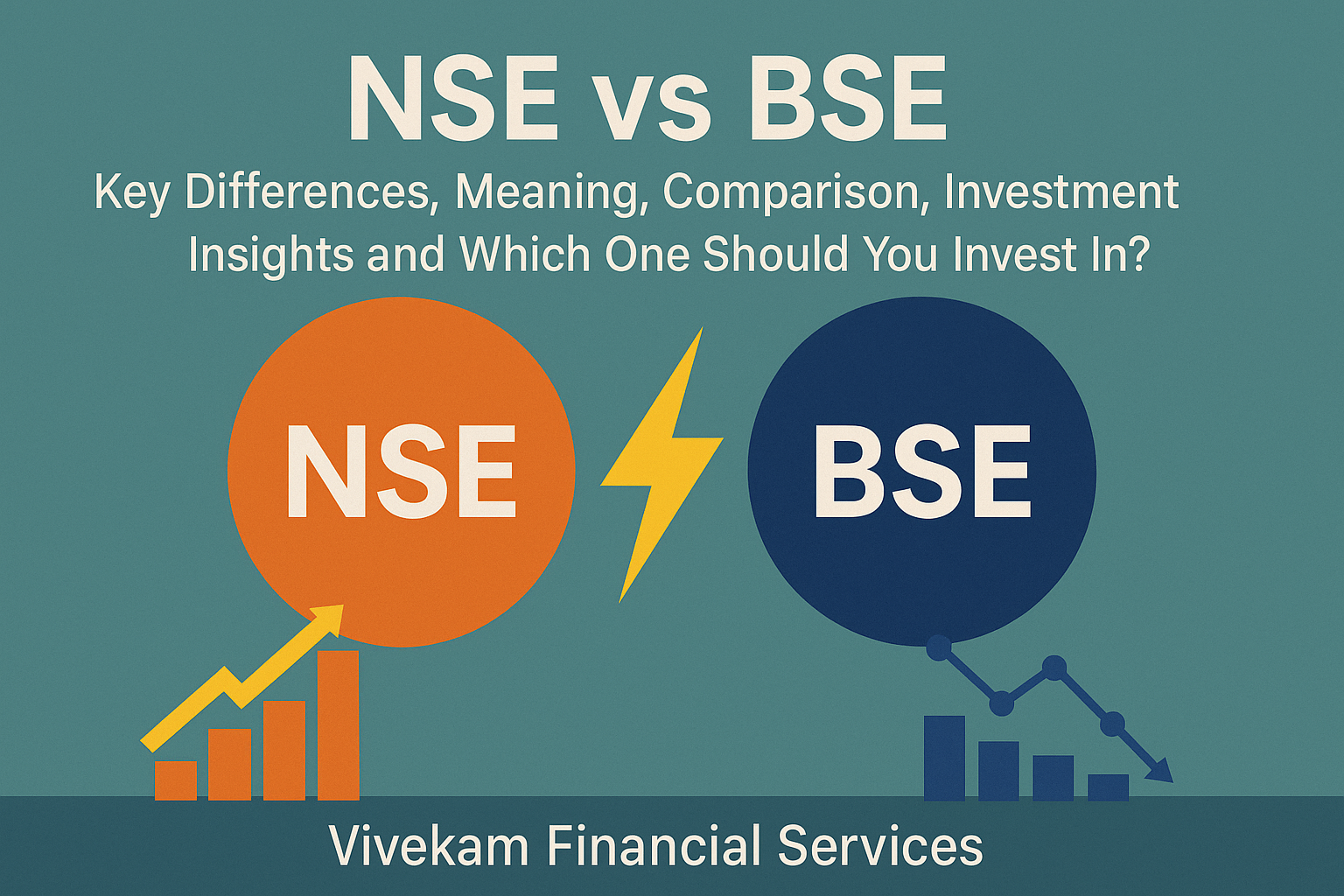NSE vs BSE: Key Differences, Meaning, Comparison, Investment Insights

Introduction to Indian Stock Exchanges
The Indian stock market isn’t just a financial ecosystem — it’s a fast-moving, tech-driven battlefield where timing, liquidity, and strategy decide your success. If you’re new to investing, phrases like What is NSE and BSE, NSE vs BSE, or Difference between NSE and BSE can feel confusing. But understanding the basics is half the game.
Both exchanges offer opportunities, but they do not function the same way. Their structure, history, liquidity, and trading behavior influence your profits more than you might think.
What are NSE and BSE?
At the most basic level, both are platforms where buyers and sellers trade securities. But beneath the surface, they differ in popularity, technology, volumes, and user experience.
Understanding these nuances helps investors avoid costly mistakes and choose the exchange that fits their goals.
Importance of Understanding NSE vs BSE for Investors
A beginner often thinks:
“Both exchanges show the same company. Why does it matter?”
It matters because:
- The price isn’t always the same.
- The liquidity can dramatically change your execution.
- The spread can silently eat into your intraday gains.
- The speed can influence your success in volatile markets.
This is why knowing the Difference between NSE and BSE is essential before trading.
Understanding the Bombay Stock Exchange (BSE)
BSE Full Form and Meaning
The full form of BSE is Bombay Stock Exchange. The name alone carries legacy, prestige, and historical weight.
History and Evolution of BSE
Started in 1875 under a banyan tree in Mumbai, BSE wasn’t just India’s first exchange — it was Asia’s first. Over time, it evolved from a manual, paper-based market into a fully electronic one, gaining global recognition.
Key Features of BSE
- Hosts the highest number of listed companies in India
- Home to the iconic Sensex
- Favored by long-term investors seeking price stability
- Older and more established than NSE
Trading Mechanisms on BSE
Today, BSE uses BOLT, one of the most reliable trading systems in the country. While technologically strong, its trading volumes often remain lower than NSE.
Understanding the National Stock Exchange (NSE)
NSE Full Form and Meaning
The full form of NSE is National Stock Exchange. Unlike the traditional BSE, NSE was built for a modern, electronic trading world.
History and Evolution of NSE
Launched in 1992, NSE introduced:
- screen-based trading
- electronic order matching
- transparent price discovery
This shook up the market and quickly attracted institutions and retail investors alike.
Key Features of NSE
- Dominates in daily turnover
- Preferred by traders and institutions
- Houses the Nifty 50 index
- Offers deeper liquidity in most major stocks
Trading Mechanisms on NSE
NSE’s NEAT system is fast, precise, and designed for high-frequency trading environments — one reason NSE grew exponentially.
NSE vs BSE: Key Differences Explained
Difference in Market Index: Nifty vs Sensex
- Sensex = Top 30 companies listed on BSE
- Nifty = Top 50 companies listed on NSE
These indices serve as barometers of the Indian economy — but Nifty is more diversified due to its larger basket of stocks.
Trading Volume Differences
NSE > BSE
This affects:
- execution speed
- impact cost
- slippage
- intraday performance
Difference in Listing of Companies
BSE has more listed companies, but major liquidity and trading action happen on NSE.
Technological Infrastructure and Speed
NSE historically led the digital transformation with ultra-fast execution systems.
Settlement Cycles and Liquidity
Both follow the same T+1 cycle, but NSE’s liquidity makes settlement more efficient in practice.
Investor Preferences
- Retail investors often prefer BSE
- Traders & institutions dominate on NSE due to speed and volume
Similarities Between NSE and BSE
Both exchanges:
- Are regulated by SEBI
- Operate under the same market timings
- Offer similar financial instruments
- Follow similar settlement rules
The underlying difference lies not in rules but in market behavior.
Why Has NSE Become More Popular Than BSE?
Higher Liquidity
NSE’s liquidity powers everything from quick trades to tighter spreads.
Technology and Transparency
NSE embraced automation early and attracted global investors.
Preference Among Traders
For intraday traders, arbitrageurs, and F&O traders, NSE is almost always the default.
NSE vs BSE: Which One Should You Invest In?
- Volume
- Price spread
- Liquidity
- Stock availability
- Your trading style
Long-Term Investing: NSE or BSE?
Both are good — long-term investors usually care more about company fundamentals than exchange choice.
Short-Term Trading: NSE or BSE?
NSE wins for:
- speed
- liquidity
- lower slippage
Practical Tips for Beginners
- Always check liquidity
- Choose the exchange with tighter spreads
- Compare prices before placing orders
- Avoid low-volume stocks on either exchange
Nifty vs Sensex: What’s the Difference?
Composition and Calculation
Sensex = 30 stocks
Nifty = 50 stocks
Nifty is broader and more representative of market sentiment.
Performance Comparison
Both move similarly over the long term, though Nifty sometimes shows smoother performance due to its diversification.
Which Index Represents the Market Better?
For broad market analysis: Nifty
For historical performance tracking: Sensex
FAQs on NSE vs BSE
1. What is the Difference Between Nifty and Sensex?
Nifty tracks 50 NSE companies, while Sensex tracks 30 BSE companies.
2. Is NSE better than BSE for trading?
NSE generally offers more liquidity and faster execution.
3. Can I invest in both NSE and BSE?
Absolutely — most brokers allow trading in both.
4. Are prices always the same on both exchanges?
No. Prices differ due to varying demand and supply.
5. Why is NSE more dominant in derivatives?
It built India’s most active derivatives ecosystem with high participation.
6. Which exchange is older: NSE or BSE?
BSE is the oldest in Asia. NSE is newer but technologically superior.
Conclusion
In summary, understanding NSE vs BSE helps you choose the right exchange for your investing or trading style. The Bombay Stock Exchange (BSE) offers legacy, stability, and a wide list of companies, while the National Stock Exchange (NSE) delivers higher liquidity, faster execution, and stronger dominance in derivatives. Knowing the Difference between NSE and BSE, along with what sets Nifty vs Sensex apart, gives you a clear edge in navigating the Indian stock market. Whether you focus on long-term investing or short-term trading, using both exchanges strategically can help you make smarter, more confident financial decisions.







